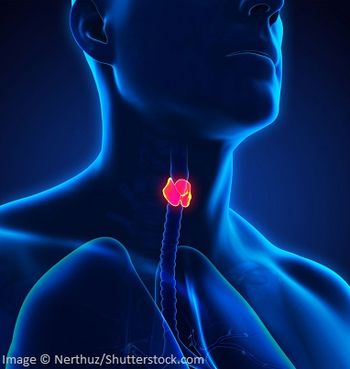
Lenvatinib Offers Promising Response Rate in Thyroid Cancer
The multi-targeted TKI lenvatinib showed promise in a phase II trial of patients with advanced, radioiodine-refractory, differentiated thyroid cancer.
The multi-targeted tyrosine kinase inhibitor lenvatinib showed promise in a phase II trial of patients with advanced, radioiodine-refractory, differentiated thyroid cancer (RR-DTC).
Though differentiated thyroid cancer has a generally good prognosis, patients with radioiodine-refractory disease have a 10-year survival rate of only 10%. “Consensus guidelines have recommended clinical trials with systemic therapies targeted to specific molecules, because traditional cytotoxic agents have demonstrated marginal efficacy and significant toxicity,” wrote study authors led by Maria E. Cabanillas, MD, of the University of Texas MD Anderson Cancer Center in Houston, in a study
Lenvatinib demonstrated activity against vascular endothelial growth factor receptors (VEGFRs), fibroblast growth factor receptors (FGFRs), platelet-derived growth factor receptor alpha (PDGFRa), and other proteins. Phase I trials with this agent showed activity against a number of tumor types, including thyroid.
This phase II trial included 58 patients with radioiodine-refractory disease who had progressed during the previous 12 months. Patients received lenvatinib at 24 mg once daily in 28-day cycles until disease progression.
The objective response rate after at least 14 months of follow-up was 50%; only partial responses were reported, and the median time to response was 3.6 months. The median response duration was 12.7 months, and the median progression-free survival was 12.6 months. Twenty-five patients (43%) achieved stable disease, and 16 (28%) had durable stable disease of at least 23 weeks.
Patients who had received previous VEGF therapy had a slightly higher objective response rate, at 59%. Of the 43 patients with papillary thyroid carcinoma, 24 had a response to lenvatinib (56%); only 5 of 15 patients (33%) with follicular thyroid histology had a response.
All patients experienced some treatment-emergent adverse events; these led to dose interruptions in 74% of patients, to dose reductions in 66%, and to study drug withdrawal in 26%. The most frequent adverse events were hypertension (76%), weight decrease (69%), and diarrhea (67%). Grade 3 or 4 treatment-emergent adverse events were also relatively common, occurring in 72% of the cohort; six grade 4 events occurred, but no grade 4 event occurred in at least 5% of patients.
The authors wrote that the similar response rates in those who were and were not treated with prior VEGFR-targeted therapy is significant. “This finding may have important clinical implications, because the use of VEGFR-targeted therapy in RR-DTC is likely to increase in the near future given the approval of sorafenib and lenvatinib as well as the investigation of vandetanib in a phase III trial for this indication,” they wrote.
The study’s results support a
Study Details
The median age of patients in the study was 63 years. Most patients were men (59%), most were white (86%), and 93% of the cohort had an Eastern Cooperative Oncology Group (ECOG) performance status ≤ 1. Twenty-nine percent of patients had received prior VEGF therapy.
Newsletter
Stay up to date on recent advances in the multidisciplinary approach to cancer.





































